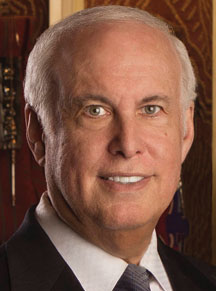Is it tradition or Jewish law?
 QUESTION: I am a member of a local Orthodox congregation here in Kansas City. My son is marrying a modern Orthodox girl in a large East Coast city. The wedding will take place in a Spanish Portuguese synagogue of which her family has been a member for generations. My son has been told by the rabbi that it is not their tradition for the bride to walk around the groom. Furthermore, my son was told he cannot wear a kittel or the white gown that many Orthodox grooms wear when they are married. Are not these laws in Judaism or are they just tradition?
QUESTION: I am a member of a local Orthodox congregation here in Kansas City. My son is marrying a modern Orthodox girl in a large East Coast city. The wedding will take place in a Spanish Portuguese synagogue of which her family has been a member for generations. My son has been told by the rabbi that it is not their tradition for the bride to walk around the groom. Furthermore, my son was told he cannot wear a kittel or the white gown that many Orthodox grooms wear when they are married. Are not these laws in Judaism or are they just tradition?
ANSWER: These are just traditions. They are not law. Unfortunately in the Spanish and Portuguese world the groom does not wear a kittel nor does the bride usually walk around seven times. That is an Ashkenazic tradition.
There are many traditions in Judaism that we hold near and dear, but they are just traditions.
For example, my wife and I have different traditions about lighting yahrzeit lights. I come from a Germanic tradition and our custom is to light a yahrzeit on Yom Kippur for all our deceased loved ones and on the yahrzeit date, the date on which they passed. We do not have a tradition of lighting a yahrzeit light on the day when Yizkor is recited in synagogue such as Passover, Shavuot, or Sukkot. My wife comes from an Eastern European background and yahrzeit lights are lit also on days when Yizkor is recited in the synagogue. It is not that one tradition is right or wrong. They are just different.
Obviously, there are many things that are law; but there are other things that are tradition depending on where your family comes from or what the tradition of the synagogue is. I am sure that if the rabbi officiating at your son’s wedding were doing the ceremony at a hotel or a private home or a catering hall, he might have been more flexible about permitting those traditions you mentioned in your question. However, with the wedding being held in a Spanish Portuguese synagogue those are just not traditions that are practiced in that type of setting.
Another area where tradition or custom plays a very important role deals with death. There are other traditions regarding whether a person should say Yizkor or memorial prayers on the different holidays in the Jewish year during the first year after the passing of a relative. Generally we advise people these days that it is preferable to say Yizkor immediately and not wait until the year of mourning passes, particularly for a parent, to recite memorial prayers on holidays. If however a family has a strong tradition for generations of not reciting Yizkor or memorial prayers in that first year after death, then they certainly should follow their family tradition.
Another area that has become a little controversial over recent years is whether or not people who have both their parents in life should recite Yizkor or not. When I was a child no one recited Yizkor for anyone if one’s mother and father were both living. Even if one had lost a sibling or G-d forbid a child or a spouse, one did not say Yizkor if one’s mother and father were both living out of respect to them.
In recent years many Conservative and even some modern Orthodox rabbis have now recommended that because of the losses of the Holocaust and for other reasons, people should remain in the service for Yizkor services. However, if one’s family tradition is to leave services during memorial prayers if your mother and father are both in life, that tradition should be followed. There are serious roots for that tradition and it is actually found in the Code of Jewish Law that one whose parents are living does not recite Yizkor. Once again you should depend on your family tradition as far as what is practiced in your individual life.


